There will be no second thoughts here, we will not touch on K-pop and the impact of covid on the country. There are only facts and stories that I experienced on myself during my exchange studies.
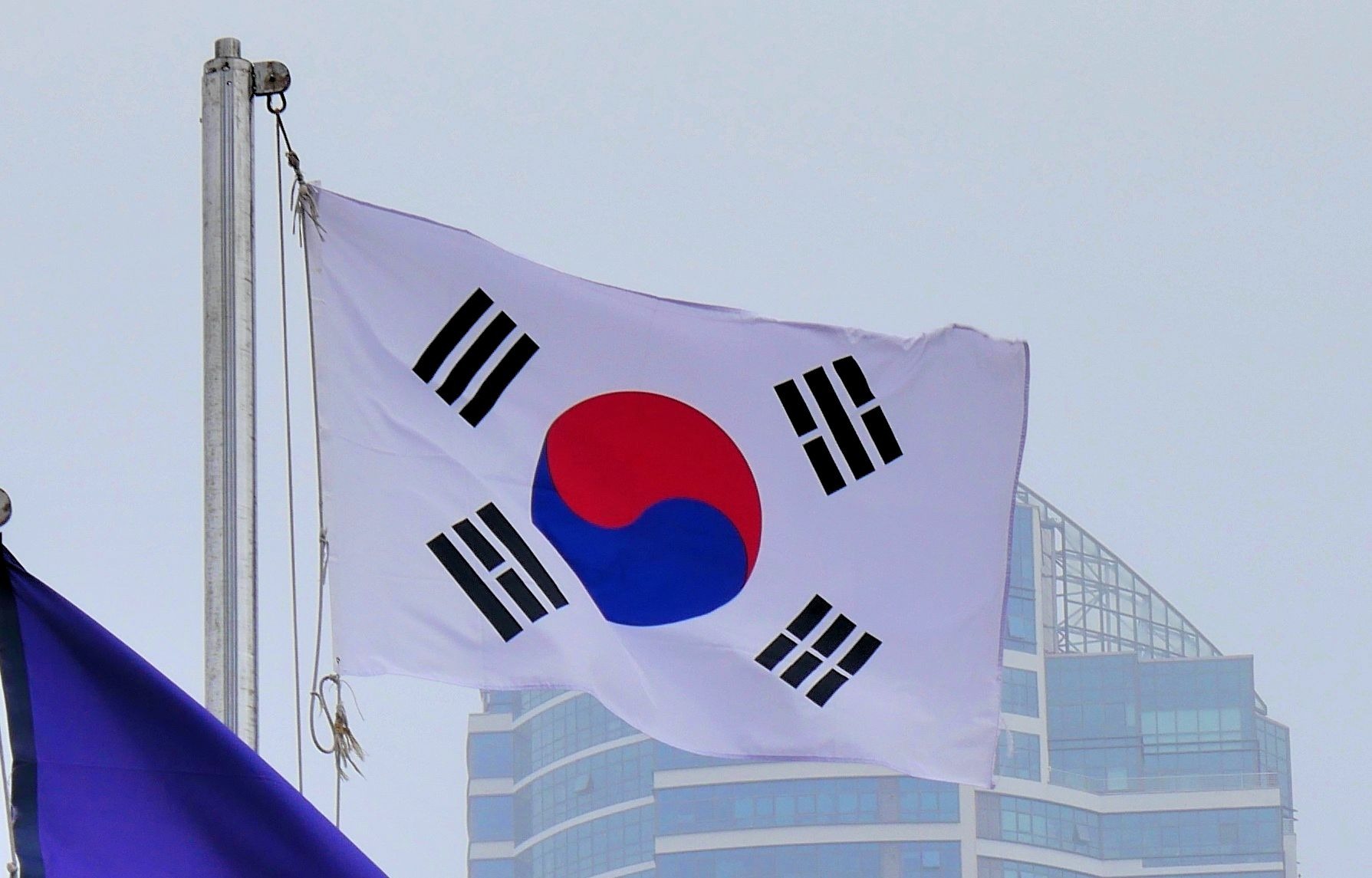
Way
I study at the Innopolis University in the direction of "Informatics and Computer Science". I always declare this with pride, because, unlike most Russian universities, Innopolis cooperates with dozens of educational institutions around the world and provides an opportunity for wishing students to study abroad.
Having collected a thick folder of documents: a resume and portfolio, a certificate of progress, letters of recommendation and motivation, a questionnaire on choosing the desired country for study, I began to participate in the competition. Oddly enough, my triplets did not interfere a bit - I successfully passed the selection to the Korea Institute of Advanced Technology (KAIST).
With great curiosity, I went to Korea and noted every detail of my new life. Finally, I looked at the sea and mountains, enjoyed the cherry blossoms, felt a truly spicy food and studied the customs and dispositions of Asians.
The coronavirus pandemic, by the way, hardly affected my travel. The outbreak originally occurred in Daegu province. She was instantly isolated from the whole country and introduced a powerful virus testing system. So in the conditional Seoul it was possible to attend events other than especially massive ones without fear.
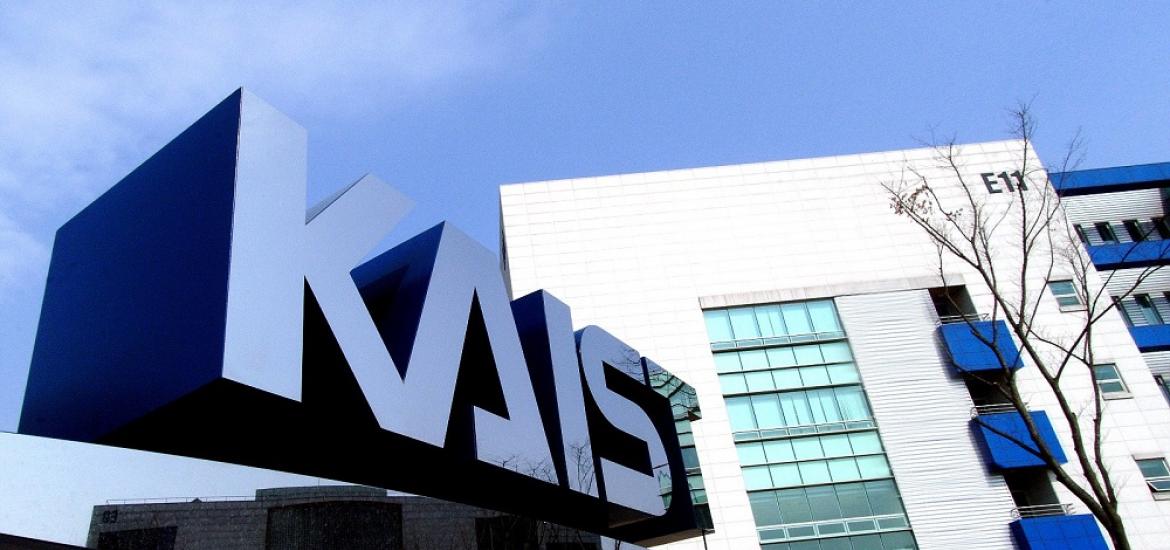
Study
The KAIST campus is located in Daejeon, one hundred kilometers from Seoul, and is considered the most prestigious of technology-related universities. Any Korean who learns about this will definitely say: “Oh, I know Kaisty (with an emphasis on the lingering Y). You must be very smart? "
It is very difficult for a Russian to understand and get used to the international education system. In short, every new undergraduate student chooses a major and undertakes to accumulate 136 credits (a measure of academic workload) in order to earn a degree. Then, before the start of the semester, they independently choose subjects (courses) according to their interests. Of these, a certain number should be courses in the specialty, and the rest should be humanitarian or second specialty courses (yes, there is no need to take a master's degree to get an additional specialty).
As a rule, the student receives 2-4 credits for the course. Depending on the ability to work, the duration of study can take from three to six years. They don't put you in any frame - learn at your own pace. If you're tired of the course in the middle of the semester, just drop it. If you burn out, take an academic leave for a year or two.
With all these seemingly concessions, KAIST students are plowing as if not into themselves. For Koreans, admission is a huge competition in which one of the hundreds of the strongest wins. One can argue endlessly about their human qualities, but scientists turn out to be notable. Foreigners, on the other hand, are given a special test upon admission, so that almost anyone who is capable of passing the tests can get into the walls of the best Korean university.
In my studies personally, I regularly experienced eternal stress and dismoral - the technique “forget about the subject for a couple of months, you will prepare before the exam” did not work at all. I had to study from the very first week, homework, projects, reports and tests followed me weekly. But the most painful thing is when the professor sends a document with grades for everyone. I must admit that I have never seen in Innopolis that 90% of students receive> 90% for a rather difficult homework.
And yet KAIST is considered the first due to its scientific activities. Here, many students work in labs or university startups. They perform interesting and even disruptive tasks for a couple of hours a day, getting decent pay. The average salary of a student-employee of the laboratory is about 40 thousand, translated into rubles.
Job
For expats in Korea, life is not at all the same as in Europe. This is not just a different country - it is a different mentality and a different attitude. Be prepared that it is extremely difficult to find a job without knowing the language. There are not many companies working for the foreign market, and most positions require communication with Koreans. And, of course, your visa must be long-term.
As elsewhere in the world, foreigners with a desire to teach children English are welcome in Korea. In general, quite a few young couples practice tourism, in which they stay in the country for six months, live and earn money by communicating with children in English. Then they go to the next country, and so on until they get bored.
Everything is very sad in the IT sector. It is unlikely that a programmer will be able to find more than a dozen suitable vacancies. And those that will, will not be able to please with working conditions and schedule - most Koreans work overtime and do not see anything wrong with that. At the same time, salaries are kept low. To say "yazh a programmer" in Russia is still much more prestigious.
Analysts, projects, products and other sociable persons - if you decide to live and work in Korea, learn the language. By the way, it is unusual for our ear, but not so complicated.
Try yourself as an entrepreneur. Find a Korean partner at the nearest bar and open a national restaurant with him. With all the abundance of cafes in cities, such places always stand out and attract crowds of visitors. Or come up with an interesting concept of entertainment or excursions for English-speaking tourists. For example, the famous Seoul Pub Crawl bypasses several bars and clubs with dozens of party-goers every day, collecting decent money from each.
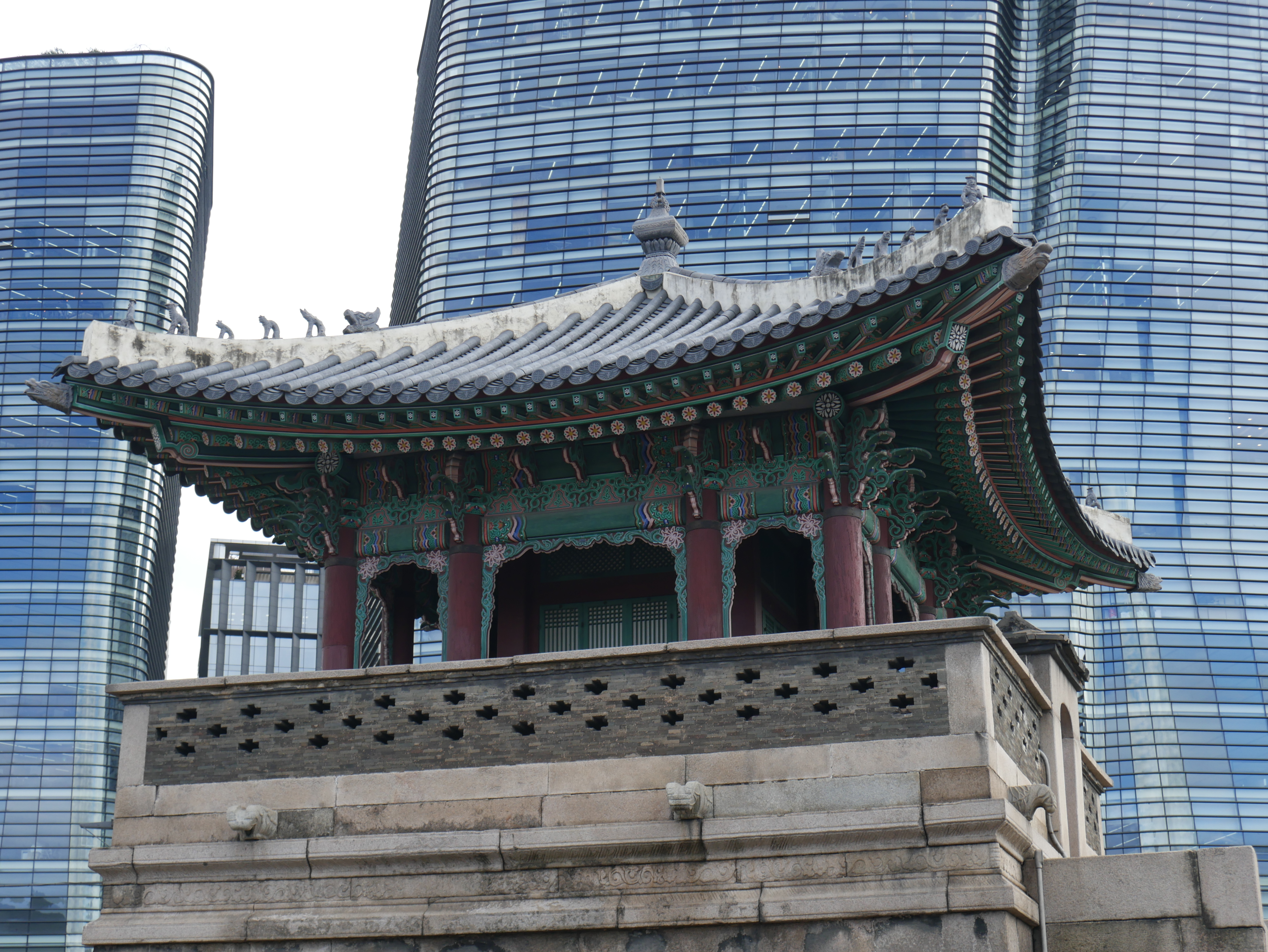
City and manners
One day in Daejeon's supermarket, a funny situation happened to me. I remember I bought a basket full of food and went to the checkout. There, an elderly woman began to punch goods. Everything was calm until, on the banana package, she addressed me extremely emotionally. Understanding only “hello” and “thank you”, I opened my eyes in surprise and began to cry what. There was no one around. We switched to gestures and started playing crocodile. In less than half a minute, I understood: she told me to go to the fruit department and take the second pack of bananas, because there was a 1 + 1 promotion.
The situation is deeply embedded in my head. It simultaneously shows the sincere benevolence of Koreans (this is not a special case, people really are much more willing to help than in Russia) and the possibility of non-verbal communication.
As you can see, in the very first days in another country, I decided to give up language learning. But I do not advise you that. When communicating more difficult than “help translate,” Koreans will show all their shy nature. Those who have not studied abroad may hide their knowledge of English just because they are not sure of themselves. At the very least, try to gain the Korean's trust by speaking in Korean. And then you can try to switch to English.
What makes Korea extremely different from Russia is the streets. Inside the city, you will be amazed at how narrow and uncomfortable they are. On one lane, cars and pedestrians will certainly try to disperse with maximum confidence in each other. They only heard about sidewalks on the avenues. If you are a pedestrian, don't even dare try to prove anything - the driver is always right. And it is the drivers who have absolute priority on the road: the rule “stepped on the zebra, everyone stopped” does not work, and the red traffic light for pedestrians will stay on for three minutes.
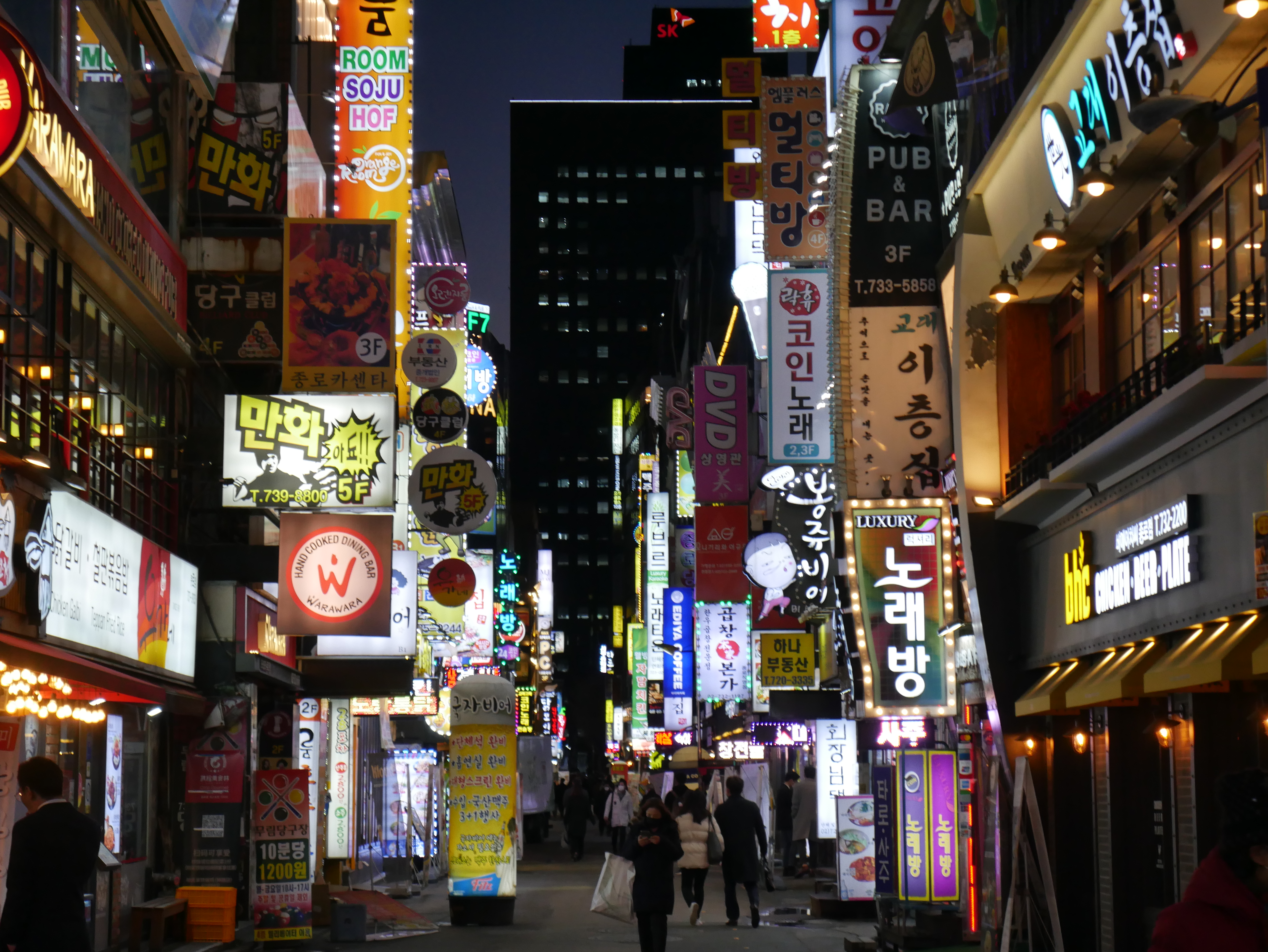
However, the cramped Korean streets have their own charm. Dozens of establishments open their doors in the evening. Hundreds of signs burn on the walls of houses. Music is heard from everywhere, and people shamelessly drink soju on the way from bar to bar - drinking alcohol in public places is not prohibited.
What cannot but please the tourist is the abundance of food. Restaurants of all price categories will offer you to try everything - from the signature fried chicken in the hottest sauce to the freshly chopped octopus with still moving tentacles. This gastronomic variety will never end, especially considering the bonuses that Russian people are not used to: a decanter of replenished water and an additional dish - kimchi, radish, lettuce or anything else - go to any dish in any restaurant. At first, I put it in my mouth myself, not realizing that - many dishes and even ingredients do not have a translation into Russian.
But if you want to find a specific place in advance, forget it. There will be almost nothing on online maps. Thus, shopping in Korea becomes extremely difficult if the goods you need are not in the supermarket.
Navigation itself around the city, on the contrary, can only please: online maps will lay out several routes and help you choose the most convenient one, and transport stops with smart electronic boards will not let you miss the bus you need. Moreover, there is a unified T-money payment system across the country, similar to the Moscow Troika, and all signs are duplicated in English.
I am also glad that, being in South Korea, I was able to observe real democracy. In April, when the kovid was considered almost defeated, in one of the lectures I listened to a teacher who urged all Korean students to come to the polls. Then they voted for new faces in parliament, and, according to feelings, none of the citizens stood aside. Everyone around them discussed the pre-election promises of politicians, argued and even more called to come. The air was full of competition and people's involvement. This is exactly what Russia lacks so much.
Documents and banking
While I was living in Korea, I needed a local bank card for personal reasons. The first step in obtaining it was the registration of a foreign resident at the migration office. The university helped me with this, but for most “aliens” for the Alien Registration Card, you need to collect a whole list of documents and wait about a month.
This card makes it possible to purchase SIM cards from official retailers (in some supermarkets you can buy a SIM card with a foreign passport and cash, which I did), use banking services and much more. However, it does not replace the Korean ID. That is, in places that require you to enter an ID, ARC will not work, and you will not be able to rent a city scooter.
Having received ARC, I went to the nearest Woori bank (I chose it according to the convenience of working with foreign clients), where I was forced to sign 20 sheets of the agreement in Korean, and after half an hour I was given 2 cards and a passbook (remember, 2020 is in the yard). Of course, no one really could explain why it was all needed. Back at the hostel, I began to figure it out.
To activate the card, I needed to register with the online bank. The site has a “global” version, different from the stylish Korean one. They immediately attacked me with a request to install 5 programs to start using the service. Thus, they say, the security of data and, therefore, your money is ensured.
The installer failed with 1 out of 5 programs - there was no application for protecting input from the MacOS keyboard. As a result, the site was allowed inside, but forced to enter all the data through the virtual keyboard by clicking:
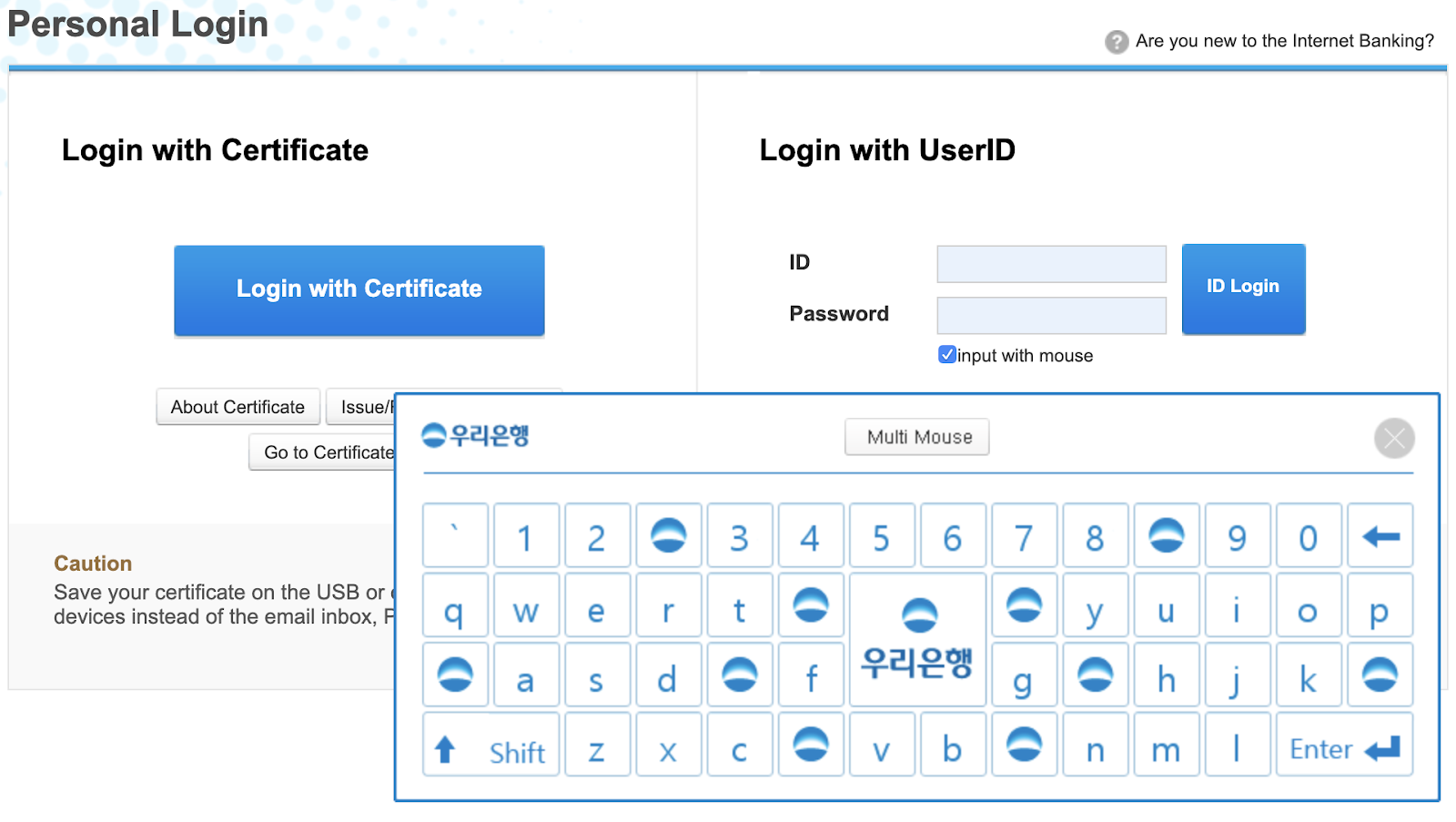
Next, I poked around the site, was completely disappointed in it and downloaded the mobile application. For him, I also had to install additional software, but after that everything at least worked stably. But the password did not match the newly created account! Out of emotion, I threw the phone away.
After some rest, I returned to the application and found an opportunity to create an “electronic certificate” connecting the site and the mobile application. With him, everything worked as expected. Thus, I requested the balance for several hours.
But I didn't know that the problems with the bank were just beginning. In short: you cannot make purchases from Korean cards on foreign sites such as Airbnb (until you go to the bank's office to activate a special option), and for any online transaction you need to use the second card issued by the bank - a card with passwords. The screen displays “Enter the first 2 digits from section 15 and the last 2 digits from section 42”. What do you think? Is it safer than in Russian banks? :)
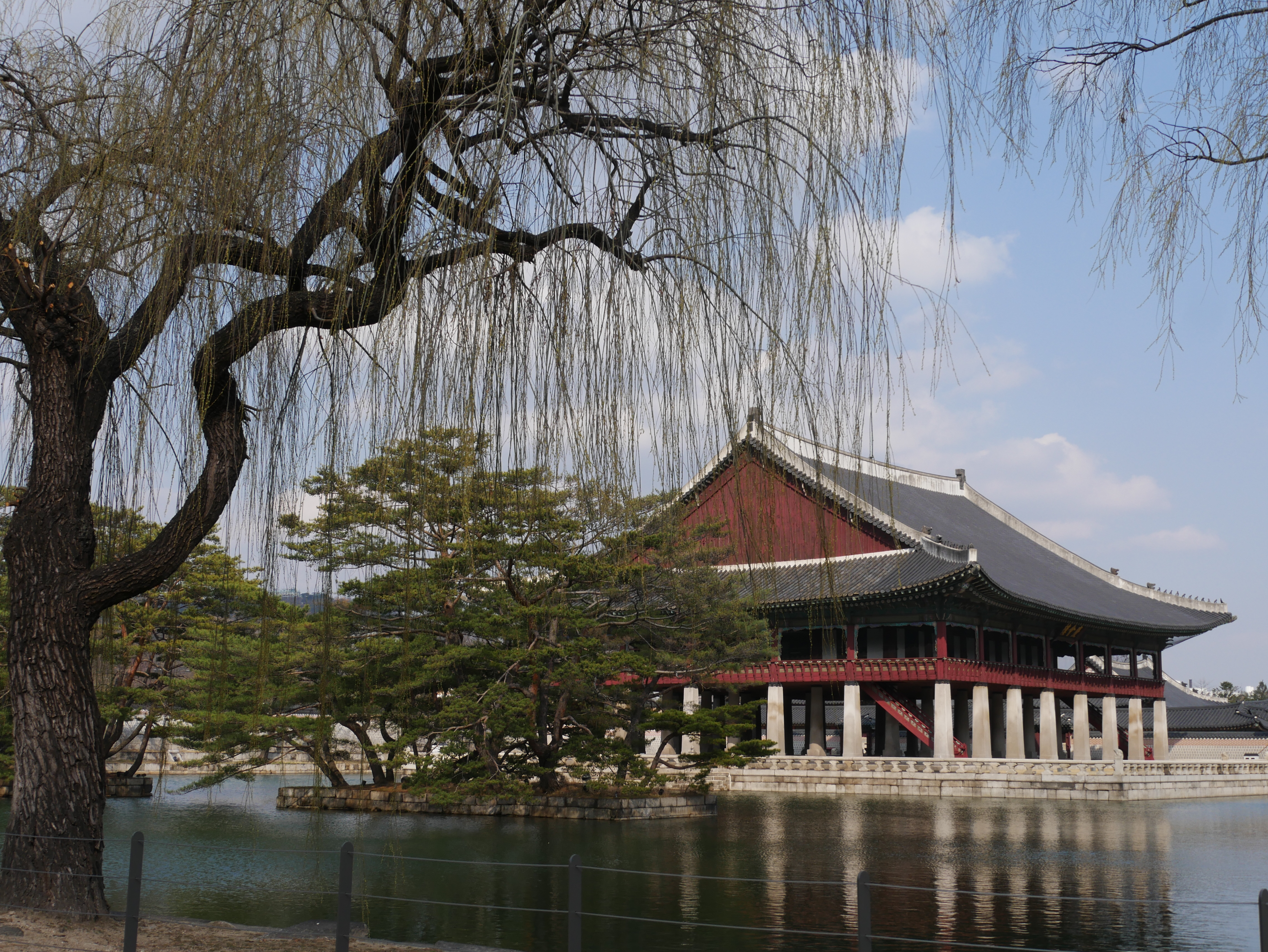
conclusions
South Korea is not easy to compare with Russia. On the one hand, we have a similar standard of living, and on the other, we have completely different thoughts in people's heads. Anyway, I advise you to add Korea to your visit list. Moreover, Russian citizens do not need a visa to stay in the country for less than two months.
I appreciate the opportunity to travel to an Asian country for exchange studies. Such an experience does not happen often, and you definitely need to fight for it. Would you come back again? Certainly! Would you stay to live? Perhaps, but only if I worked remotely.
What do you think of South Korea? Just please, no jokes about dogs.